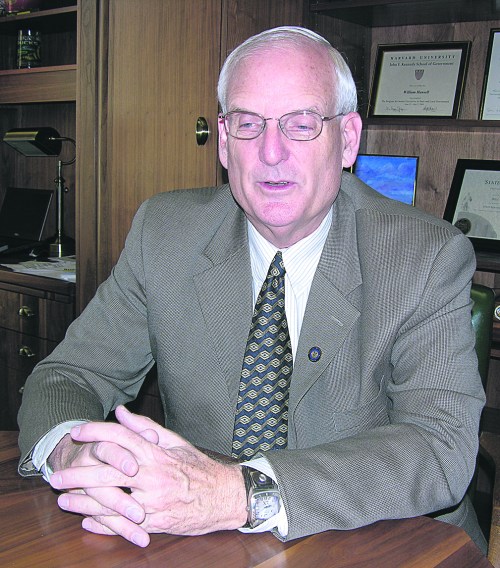Senator learns new set of ropes at Capitol
Published 8:49 am Thursday, February 28, 2013

- Mitch Lies/Capital Press New state Senator Bill Hansell, R-Pendleton, talks about legislation in his office at the Capitol. Hansell is an unusual freshman lawmaker in that he enters state politics with 30 years of experience as a county commissioner.
New post is ‘much more partisan’ than Hansell’s 30 years as county commissioner
By MITCH LIES
Capital Press
SALEM — It’s not business as usual for new state Sen. Bill Hansell, R-Pendleton, but after 30 years as Umatilla County commissioner, the Oregon Legislature isn’t foreign territory, either.
“There are a lot of similarities, but there are differences, too,” Hansell said, shortly after beginning his first term at the Capitol.
“You’re part of a bigger team. It’s much more partisan than anything on the county level,” he said. “It is the same basic financial challenges, except you’ve got more zeroes behind both the revenue and the expenditures.”
Like former Sen. Dave Nelson, who served as senator from District 29 for 16 years and who Hansell is succeeding, Hansell is a farmer. He was born and raised on the Eastern Oregon farm his grandfather purchased in the early 1900s.
His family’s roots in Oregon date back to 1852, when his great-great-great-grandfather came here on the Oregon Trail.
Today the Hansell farm includes two primary parcels, one near Hermiston where the family raises potatoes and other high-value crops, and one near Athena, where the family grows dryland wheat.
Hansell already has made no bones about his intent to support the natural resources at the Capitol. In the first meeting of the Senate Environment and Natural Resources Committee, after Sen. Alan Bates, D-Ashland, announced he was supporting environmental legislation, Hansell said:
“I’ll be equally blunt that I am on the natural resources management-development side,” he said. “That is what fuels our economy.”
Later, in an interview with the Capital Press, Hansell said:
“My district is a natural-resource-based economy. We are the bread basket of Oregon.
“Umatilla County is the number one food producing county in the state, number two in ag dollars,” he said. “Morrow County is number three. We have timber in the mountains. We have livestock, large cattle operations.
“That is what builds our economy,” he said.
But, Hansell said, his responsibility extends beyond Senate District 29 to what is best for Oregon as a whole.
“It is a platform that I have been given, first and foremost to represent the interests of the constituents of District 29, which at six-and-a-half-counties is the third largest in the state.
“But at the same time, you are voting on things that affect everybody in the state every day,” he said.
Hansell’s foray into politics started early. As a junior at the University of Oregon, he was elected class president.
After graduating from the university, he joined Campus Crusade for Christ, where he and his wife, Margaret, spent 12 years serving in Berkeley and Sacramento, Calif. He also served as national campus director for the organization in Australia.
He and Margaret returned to Eastern Oregon in 1979 and followed through on a plan to farm and raise a family.
Hansell began serving on the Umatilla County Board of Commissioners in 1982.
During his 30 years, he served as president of both the Association of Oregon Counties and the National Association of Counties.
While on the board of the national organization, Hansell said he was involved in national agriculture and rural affairs and testified on behalf of the organization in Congress. As an Oregon association officer, he was often involved in state legislation.
Last August, Nelson asked him to run for the seat Nelson had held since 1996.
“I had already decided I wasn’t going to seek re-election to the board of commissioners,” Hansell said. “After 32 years, it was probably time to hand the baton off,” he said, “but this provided an opportunity for another area of service.
“I felt my roots and my experience fit well with District 29,” he said.
As a farmer, Hansell is in the minority in the Capitol. He believes one of his roles is to educate urban lawmakers about agriculture.
“A lot of it is just education,” Hansell said, “in that the urban folks have questions about things like, what is an acre-foot of water? How do you get your products to market? Why is the wolf issue so important?
“And the reverse is true, too,” he said. “We certainly don’t have light rail in my district.”
Hansell said he expects to spend part of his time on the offensive, pushing for bills that help rural Oregon, and part on the defensive, defending rural Oregon from bills that could hinder it.
“For example,” he said, “there is a bill that has been dropped that would outlaw canola anywhere in the state of Oregon. These are the kinds of things that may be well-intended for a particular purpose, but the impact, you’ve got to let people know.”
“On the offense, I am going to promote working on a program to use more of the Columbia River water, to work on storage,” he said.
“We could be an oasis. We could be the Imperial Valley of California. We have the growing season. We have the land available. But it is in a low rainfall area. We’ve got to be able to irrigate,” he said.
“If we could get 500,000 acre-feet of water, it would provide water for 100,000 additional irrigated acres for high-market vegetables and fruits, create between 5,500 and 7,300 new jobs, provide approximately $220 million per year in added revenue, increase state and local property taxes by $25 million, and slow or halt the groundwater declines.”
Despite his years of experience in politics, Hansell said he still feels like a rookie some days in the Capitol.
“I’m a new guy here,” he said. “I’m a freshman. I don’t know what is doable or how it gets done in the final analysis.
“I know it could well end up and will probably end up in sausage making. The big difference is previous to this, I was outside the sausage-making process.
“Now, I guess I am in the butcher shop making it. And I don’t know all the details yet,” he said, “but I’m learning.”









